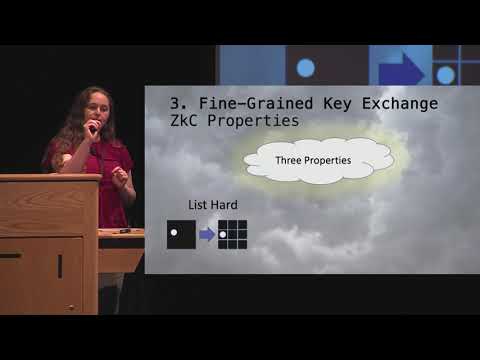CryptoDB
Public-Key Cryptography in the Fine-Grained Setting
| Authors: | |
|---|---|
| Download: |
|
| Abstract: | Cryptography is largely based on unproven assumptions, which, while believable, might fail. Notably if $$P = NP$$, or if we live in Pessiland, then all current cryptographic assumptions will be broken. A compelling question is if any interesting cryptography might exist in Pessiland.A natural approach to tackle this question is to base cryptography on an assumption from fine-grained complexity. Ball, Rosen, Sabin, and Vasudevan [BRSV’17] attempted this, starting from popular hardness assumptions, such as the Orthogonal Vectors (OV) Conjecture. They obtained problems that are hard on average, assuming that OV and other problems are hard in the worst case. They obtained proofs of work, and hoped to use their average-case hard problems to build a fine-grained one-way function. Unfortunately, they proved that constructing one using their approach would violate a popular hardness hypothesis. This motivates the search for other fine-grained average-case hard problems.The main goal of this paper is to identify sufficient properties for a fine-grained average-case assumption that imply cryptographic primitives such as fine-grained public key cryptography (PKC). Our main contribution is a novel construction of a cryptographic key exchange, together with the definition of a small number of relatively weak structural properties, such that if a computational problem satisfies them, our key exchange has provable fine-grained security guarantees, based on the hardness of this problem. We then show that a natural and plausible average-case assumption for the key problem Zero-k-Clique from fine-grained complexity satisfies our properties. We also develop fine-grained one-way functions and hardcore bits even under these weaker assumptions.Where previous works had to assume random oracles or the existence of strong one-way functions to get a key-exchange computable in O(n) time secure against $$O(n^2)$$ adversaries (see [Merkle’78] and [BGI’08]), our assumptions seem much weaker. Our key exchange has a similar gap between the computation of the honest party and the adversary as prior work, while being non-interactive, implying fine-grained PKC. |
Video from CRYPTO 2019
BibTeX
@article{crypto-2019-29927,
title={Public-Key Cryptography in the Fine-Grained Setting},
booktitle={Advances in Cryptology – CRYPTO 2019},
series={Lecture Notes in Computer Science},
publisher={Springer},
volume={11694},
pages={605-635},
doi={10.1007/978-3-030-26954-8_20},
author={Rio LaVigne and Andrea Lincoln and Virginia Vassilevska Williams},
year=2019
}

